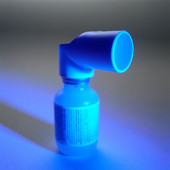Stopping Controversial Asthma Drugs Could Have Downside: Study
Findings differ from FDA caution on combination therapies
 MONDAY, Aug. 27 (HealthDay News) -- It's OK for some patients with asthma to stick with a combination of medications instead of abandoning one because of concerns about complications, a new analysis of existing research suggests.
The U.S. Food and Drug Administration has warned that asthma patients who take both long-acting beta-agonist and inhaled corticosteroid medications should be cautious about using them together once their condition is under control.
Long-acting beta-agonists -- such as drugs known by the brand names Serevent, Foradil and Brovana -- could cause side effects, the FDA cautioned, as could combination drugs. For that reason, the agency suggested that patients consider going with inhaled corticosteroids alone.
However, the new analysis came to a different conclusion. "Adding a long-acting beta-agonist to an inhaled corticosteroid medication makes a lot of sense in a number of patients since you get better control of the disease," said Dr. Thomas Casale, chief of allergy and immunology at Creighton University, and lead author of the report.
The report was published online Aug. 27 in the journal Archives of Internal Medicine.
At issue is how to best treat adults and older children who suffer from moderate to severe asthma.
Inhaled corticosteroids, which come in inhalers and are known by brand names such as Azmacort and Flovent, are often prescribed by themselves to reduce wheezing and other symptoms. They're usually taken daily but don't relieve asthma attacks when they're occurring. (Short-acting beta-agonists, such as the drug albuterol, treat asthma attacks themselves.)
The newer long-acting beta-agonists are frequently used with inhaled corticosteroids. Some medications, sold under the brand names Symbicort and Advair, combine both types of drugs.
This latest analysis, which examined five studies involving patients aged 15 or older, found that removing a long-acting beta-agonist -- but continuing treatment with an inhaled corticosteroid -- was worse for patients than continuing both drugs.
Patients who dropped the long-acting beta-agonists reported more asthma problems and fewer days with no symptoms. The findings also suggested that these patients needed more treatment of asthma attacks. The studies, however, didn't allow researchers to examine the risk of death under the different approaches.
Casale said he doesn't think the FDA's concerns about death and other health problems -- which resulted in a bold warning on drug labels -- have deterred physicians from prescribing the combination treatments. However, he said, they have reinforced guidelines recommending against using the long-acting beta-agonists as treatments by themselves.
"I think all of us agree with that," he said. "They're only to be used in conjunction with an inhaled corticosteroid, and only in those who aren't adequately controlled."
In an accompanying journal editorial, Dr. Chee Chan and Dr. Andrew Shorr, both from the division of pulmonary and critical care medicine at Washington Hospital Center in Washington D.C., wrote that they hoped the analysis "helps to lift some of the black clouds" in the debate over the use of the asthma drugs.
More information
For more about asthma, visit the U.S. National Library of Medicine.

|